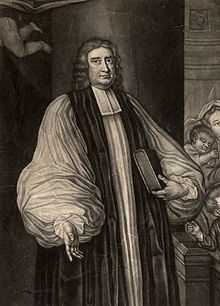Hugh Boulter
Hugh Boulter (4 January 1672 – 27 September 1742) was the Church of Ireland Archbishop of Armagh, the Primate of All Ireland, from 1724 until his death. He also served as the chaplain to George I from 1719.

Background and education
Boulter was born in London and was educated at Merchant Taylors' School before attending Christ Church, Oxford. However, after only a year at Christ Church he transferred to Magdalen College.
Career
After leaving the university in 1700 Boulter served as a chaplain to several prominent individuals, including Sir Charles Hedges, the Secretary of State for the North, and Thomas Tenison, the Archbishop of Canterbury, before being awarded his D.D. in 1708.
After spending seven years working as a rector, Boulter was appointed as the archdeacon of Surrey in 1715. In 1719 Boulter was announced as the successor to George Smalridge as both the dean of Christ Church college and as the bishop of Bristol. Boulter was controversially offered the primacy of the Church of Ireland in 1724, William King, as Archbishop of Dublin the natural successor to the title, being passed over due to his opposition to the Toleration Act. As Archbishop of Armagh Boulter was a keen supporter of the so-called English interest, the filling of top judicial, political, and ecclesiastical posts in Ireland with Englishmen in order to maintain English power in the country, a position that made him unpopular in Ireland.
His policy was to leave the Roman Catholics in Ireland subjected to penal legislation. By a statute enacted through Boulter's influence Catholics were excluded from the legal profession, and disqualified from holding offices connected with the administration of law. Under another act passed through Boulter's exertions they were deprived of the right of voting at elections for members of parliament or magistrates—the sole constitutional right which they had been allowed to exercise.[1] His actions were often viewed with suspicion by the people of Ireland, including Jonathan Swift.
When the harvest failed in 1729 in Ulster he bought food and supplied it to the region.[citation needed] He did much good work in trying to alleviate the Great Irish Famine (1740-1741).
In 1731 he submitted the findings of the Inquiry into Illegal Popish Schools by the House of Lords, which was set up "to prevent the growth of Popery, and to secure this Kingdom from any dangers from the great Number of Papists in this Nation."[2] He supported the setting up of the charter school system, "to teach the children of the papists the English tongue, and the principles of the Christian religion", as long as they converted to Protestantism. In 1731 George II was petitioned for a charter to set up these schools, which was granted in 1733.[3] Boulter contributed £400 towards the construction of a charter school for girls at Santry, Dublin.[4]
He was responsible for forcing through a bill that revalued the price of gold in 1738, to the benefit of the poor.
References
- ↑ Dictionary of National Biography
- ↑ Reports, P.R.O., Ireland, (i) Printed. Lot 50 ; No. 5 : (2) MS. Lot 72 ; Nos. 90, 91, 100, 105, 113, 131, 132, 133, 136, 160, 161, 162, 163, 170, 171, 181, 209, 211, 212, 226.
- ↑ Letter to the Archbishop of Canterbury, in Letters written by his Excellency, Hugh Boulter, D.D., Lord Primate of Ireland, to several Ministers of State in England, and some others. Dublin, 1770.
- ↑ D'Alton: History of the County of Dublin, 1835, p. 259
- Stuart, James (1900). Historical memoirs of the city of Armagh. Dublin, Browne & Nolan
| Wikisource has original text related to this article: |
| ||||||||||||||
|